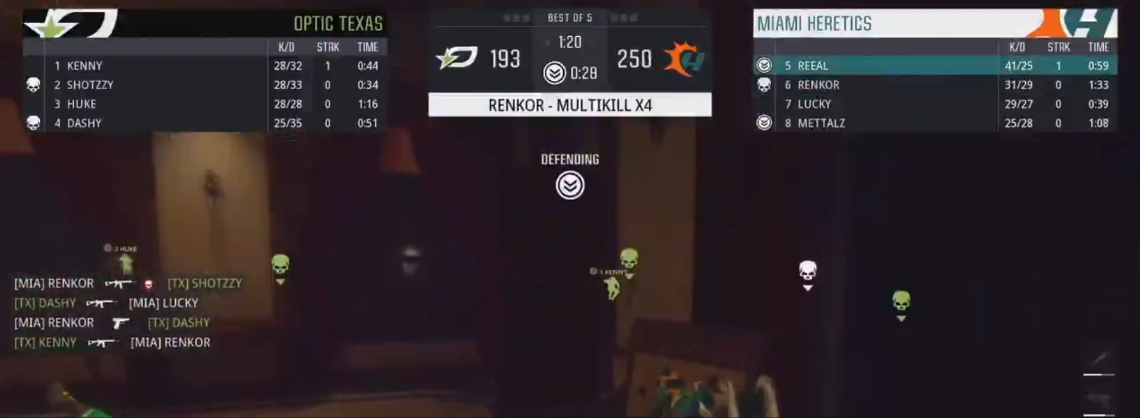
Related Stories
Optic Gaming Struggles in Hardpoint on LAN: Analyzing the Challenges
Optic Gaming, one of the most iconic and celebrated organizations in the competitive Call of Duty scene, has faced its share of ups and downs. Known for their dominant performances and legendary players, the Green Wall has had fans on the edge of their seats for years. However, when it comes to Hardpoint on LAN, Optic has experienced some struggles that have raised questions among fans and analysts alike.
The Importance of Hardpoint in Competitive Call of Duty
Hardpoint has always been a central mode in Call of Duty's competitive landscape. As one of the most fast-paced and objective-based game types, it tests team coordination, map control, and individual skill under intense pressure. In LAN tournaments, where the stakes are higher and the competition is more fierce, mastering Hardpoint is crucial for any top-tier team hoping to claim victory. This mode demands precise rotations, effective gunfights, and strategic planning to outmaneuver opponents while securing those valuable points.
Optic’s Recent Hardpoint Struggles
While Optic Gaming has proven time and time again that they are a force to be reckoned with in many aspects of competitive Call of Duty, their recent Hardpoint performances on LAN have raised some eyebrows. Let’s break down the key factors contributing to their struggles in this particular mode.
1. Consistency Issues
One of the most prominent issues for Optic on LAN has been their consistency. Hardpoint is a game mode that rewards teams that can keep their composure and maintain pressure throughout the match. Optic has shown flashes of brilliance, but they often struggle to maintain that level of performance over the course of a series. At times, they look like the dominant team that fans expect, but there are also moments where they seem to falter, especially during crucial rotations or when defending points.
2. Rotation and Map Control
Hardpoint heavily relies on strong rotations to secure favorable spawns and control key areas of the map. Optic has had moments where their rotations on LAN have been less than optimal. Against top-tier teams, a single mistake in rotation can mean giving up crucial points or allowing the enemy to build momentum. These lapses can be amplified on LAN, where the pressure and crowd noise add extra layers of intensity. When you’re up against teams that are relentless in their pursuit of map control, Optic has sometimes appeared out of sync with their timing or positioning, which leads to missed opportunities.
3. Gunfights and Pressure
Hardpoint isn’t just about rotations and strategy—it's also about raw gun skill. In LAN settings, the pressure is immense, and even the most skilled players can occasionally miss key shots or make uncharacteristic mistakes. While Optic has always had strong individual players, some of their star performers have occasionally underperformed in high-pressure Hardpoint situations, particularly when faced with consistent aggression from their opponents. In a mode that requires quick thinking and fast reactions, a few lost gunfights can result in a significant swing in momentum, which can be hard to recover from in such a fast-paced environment.
4. Adaptation to Opponents
Another challenge that Optic has faced on LAN is their ability to adapt to the playstyles of their opponents. Hardpoint is a game mode that rewards teams who can adapt and outsmart their competition by predicting and reacting to their movements. Teams that have studied Optic’s tendencies and learned how to break their setups have found success against them. Whether it’s by exploiting certain weaknesses in their rotations or countering their setups, some teams have been able to capitalize on Optic’s predictable patterns.
5. Team Synergy
Though Optic’s individual players are undoubtedly talented, Hardpoint requires exceptional team synergy. The communication, positioning, and cohesion between players are all crucial to success in this mode. In some recent LAN events, there have been moments where Optic’s teamwork seemed a bit disconnected, whether due to miscommunication during crucial moments or a lack of synergy in executing team-oriented strategies. In a high-stakes environment, every small mistake can make a huge difference, and Optic’s reliance on individual brilliance sometimes falls short when it comes to collective execution in Hardpoint.
The Road Ahead for Optic Gaming
Despite these struggles, it’s important to remember that Optic Gaming is a team with immense talent and experience. They’ve overcome challenges before and have the potential to bounce back stronger than ever. To improve in Hardpoint on LAN, Optic needs to focus on refining their rotations, ensuring their gunplay remains sharp under pressure, and continuing to build stronger team cohesion.
The competitive Call of Duty landscape is ever-evolving, and with the right adjustments, Optic Gaming can turn their Hardpoint struggles into a thing of the past. Whether it's through strategy changes, focusing on mental resilience, or fine-tuning communication, the Green Wall will likely be back at the top of the Hardpoint ladder soon enough.
Until then, fans can only sit back and watch as one of the most storied teams in Call of Duty history looks to reclaim its dominance on LAN.


